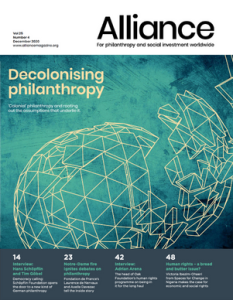What has charitable giving achieved over the last few decades? It’s a question that implicates billions of dollars, millions of people, and countless hours of work and effort, yet the answer is frustrating: Modern charity has largely failed to produce real, lasting change. The wealth and income gap is widening, not closing. Equality of opportunity and full participation in society are out of reach for billions of people in the world. And in many ways, charity and aid have further intensified these systemic challenges.
I am not saying that giving and sharing one’s wealth, resources, and knowledge is useless. But traditional charity approaches do not produce deep, systemic change. When done with another approach – giving and sharing of what one has can, in fact, be transformative and result in a more equitable society. That other approach is solidarity.
Charity: Good intentions but problematic underpinnings
In charity, the giver’s comfort is protected: they are not challenged to think about systemic inequities, or why and how they have wealth and power while others do not. They face no accountability. The giver is considered ‘good’, kind, and intelligent, and holds the power to determine who, what, and how to give. And the receiver is expected to please, respect, and be grateful and accountable. Charity relies on and perpetuates the inequity between the giver and the receiver.
Solidarity: an alternative, transformative, framework
‘If you have come here to help me you are wasting your time, but if you have come because your liberation is bound up with mine, then let us work together.’
- Lilla Watson – Murri (Indigenous Australian) visual artist, activist and academic
Solidarity offers a different framework, both for the values that underpin it and the outcomes it produces. Solidarity is about working together, across privilege and oppression, with shared power, towards a more just and inclusive world that is healthier and more fulfilling for all.
- Solidarity recognizes that no one person or group is better than another.
- Solidarity is a belief in and yearning for justice – the equitable distribution of money, opportunities, and power among all members of society.
- Solidarity involves and requires humility, respect, and genuine collaboration in the work to improve this world.
- Solidarity is built on the foundational understanding that we cannot build a more equitable and inclusive society if we are not equitable and inclusive in how we get there.
Solidarity in practice: Recognizing systemic injustice and our role within it
Intrinsic to solidarity is a belief in and striving for justice – the equitable distribution of money, opportunities, and power among all members of society.
An approach of solidarity and justice recognizes that systemic injustices cause much of the world’s privileges and suffering, not individual decision-making, or luck. It recognizes that certain groups of people have more wealth, power, and opportunity, at the cost of others who are more marginalized or excluded in their rights, opportunities, and full participation in society.
Solidarity and justice thus demand a shift in power towards more equitable distribution of resources and control. When social justice is the goal, band-aid fixes are inadequate – it is necessary to expose and redress the systems that cause inequity and oppression. When we seek justice, we recognize that we are complicit in and benefit from the imbalances of power and privilege in this world.
If we are truly working for justice, that means reflecting and acting on:
- Where and how we have power and where we don’t have it,
- What led to this imbalance historically and systemically,
- How we can use our power to create a more just world
- Where and how we need to relinquish power.
Solidarity in practice: Shifting power, relinquishing control
A more equitable and inclusive society requires an equitable and inclusive approach and practice. This requires shifting power and relinquishing control.
Based on our research and to shift to a solidarity approach, my own organization, Firelight, has abandoned many practices that maintain control and power with us as ‘giver’. Instead, we have embraced practices that put more power and control into the hands of those closest to the issues at hand. We no longer ask organizations to write detailed proposals that meet a specific agenda that we have defined and convince us of their worthiness for funding. Based on the recommendations of a wide range of community stakeholders, we now seek out and get to know grassroots organizations that are grounded in and responsive to their communities. We support them with funding, mutual capacity strengthening, and communities of practice. In turn, this helps to strengthen their own community’s power and agency. Together with their community, they identify and address not just priority needs but also the systems and root causes underlying those issues. They also work together to define their own indicators of success. The community organization and community members lead the way in everything.
Shifting power means that those who have been excluded from development and aid discussions and decisions are meaningfully included and valued in these processes. It also means that those who understand the issues most lead the way. They can address the issues as well as systems that cause them, while funders and others who seek to be genuine partners support them.
What now?
If we are genuinely committed to a world where everyone has equal access to opportunity and full participation in society, we need to leave behind the charity approach to aid and development and embrace the values and practices of solidarity. This can look like trust-based philanthropy, philanthropy as reparations, unrestricted grants to organizations led by people most affected by issues, and supporting community-driven systems change (the approach embraced by my organization Firelight).
Charity won’t bring us justice. Solidarity is the path towards the equitable and inclusive world we all deserve. Let’s start to make that shift today.
Sadaf Shallwani is the Director of Programmes and Learning at the Firelight Foundation.
Upcoming issue: Decolonising philanthropy
 The word ‘decolonisation’ was coined to describe the withdrawal of colonial powers from territories they had occupied. What forms have decolonisation practices taken among foundations? Should philanthropy be making reparations? And what significance does decolonisation have for philanthropic institutions when they are geographically distant from the former colonies? These are among the questions to be explored in the next issue of Alliance. Guest edited by Shonali Banerjee, Centre for Strategic Philanthropy, Cambridge University and Urvi Shriram, Indian School of Development Management.
The word ‘decolonisation’ was coined to describe the withdrawal of colonial powers from territories they had occupied. What forms have decolonisation practices taken among foundations? Should philanthropy be making reparations? And what significance does decolonisation have for philanthropic institutions when they are geographically distant from the former colonies? These are among the questions to be explored in the next issue of Alliance. Guest edited by Shonali Banerjee, Centre for Strategic Philanthropy, Cambridge University and Urvi Shriram, Indian School of Development Management.
Subscribe today to make sure not to miss it!






Comments (0)